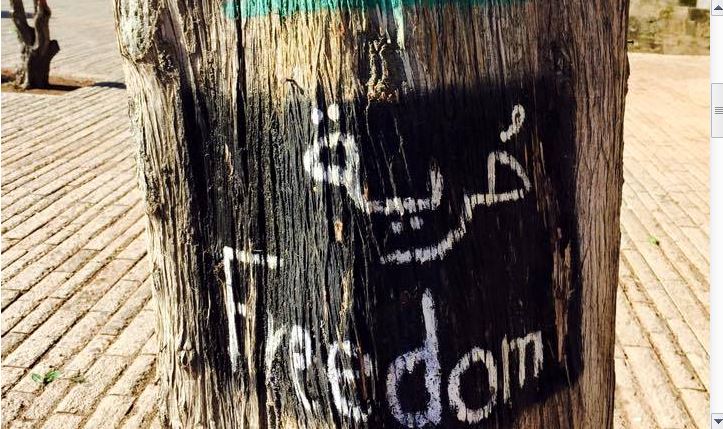I am frustrated and upset. I am disgusted and taken aback. And it is Christmas.
On December 25th, 2014, one would expect to see joy in one of the most holy Christian communities, the home of Jesus, to see a sense of compassion, love and respect. From the Arab-Christian community of Nazareth, I see nothing more than compassion and a sense of mutual brotherhood. As a human being, I have nothing but the highest sense of respect for the Arab-Christian community, but as a tourist who saw the graffiti, who saw the hate from radicals within the community of Nazareth, I cannot comprehend how the Arab-Christians can retain such brotherhood.
The moment we drove into Nazareth, the moment I looked out of the window of our bus, I knew we were in a city of co-existence. Everywhere I looked: Arabic signs with Hebrew directly next to it, both above English in order to assist tourists on religious Pilgrimages to holy sites feel more comfortable. But, the moment I stepped off the bus, everything changed.
The first thing I saw when I stepped off the bus was a tree, nature’s gift to human life. But this tree was no ordinary tree; it had been desecrated by a radical ideology pervasive within the Middle East. On the tree, below the symbol of Palestinian nationalism, below the flag of the former Palestinian Liberation Organization (PLO) lay a black flag with white writing in Arabic proclaiming freedom.
What does freedom mean, I asked myself? Does freedom entail separation from Israel within a separate Palestinian State? Does freedom entail the destruction of Israel, as has been the goal of the PLO since its founding in 1964? Does freedom come only through violent means that Daesh uses, the “Islamic State” that the symbol on the tree seemed to invoke?
I have no answers to these questions, but walking through Nazareth, I am left only in heartbreak.
Walking down the street, across from a line of graffiti proclaiming: Free Gaza, Arafat the Hero, and Resist (in Arabic) lay a swastika, Magen David, and the never ambiguous date, 1948. I had assumed that directly comparing the foundation of Israel, the homeland of the Jewish people, to the Nazi regime that attempted to wipe it out was a belief held only by a small population of radicals. Yet, as I walked down the street, seeing signs directed at Christians and Jews, proclaiming that only conversion to Islam will save their soul from the hellfire, my worldview has become shattered.
I am left only with more questions.
I am lost.
I am lost because I don’t understand. I have never been at such a loss for words. I will never lose my fervor in defending the compassionate Muslims that I have come to know as mainstream, but I can never again live in peaceful bliss that an ideology of hate has not become widespread.
I am lost, but hopefully someday, we can be found together again, in coexistence.
